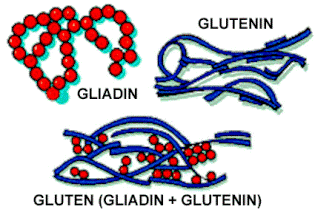
Celiac disease is the most severe form of gluten intolerance.
When people with this disease eat wheat, the immune system in the gut mistakenly assumes that the gluten proteins are foreign invaders and mounts an attack.
However… the immune system doesn’t only attack the gluten proteins, it also attacks the gut lining itself, leading to degeneration of the intestinal lining, leaky gut, massive inflammation and various harmful effects (8).
Celiac disease is serious business… it has been on the rise for decades, increasing about fourfold in the past 45 years. Right now, about 1% of people have celiac disease (9, 10).
Another condition, called non-celiac gluten sensitivity, is believed to be much more common, perhaps afflicting around 6-8% of people (11, 12).
Gluten is actually not a single protein, it is a family of different proteins and only some of them are recognized by the immune system of celiac patients.
One of the gluten proteins that seems to be problematic is called Glia-α9. One study found that the amount of this protein is significantly higher in modern wheat (13).
Therefore… many researchers have speculated that modern wheat, due to its higher amount of problematic glutens, may be worse for celiac patients than older varieties of wheat.
One study compared the effects of Einkorn (old) and modern wheat on intestinal cells from celiac patients. Compared to modern wheat, Einkorn didn’t have any harmful effects (14).
In another study in 12 celiac patients, gluten from Einkorn caused significantly less adverse reactions than modern gluten and was even better tolerated than rice – a gluten-free grain (15)!
The way wheat is prepared may also be important. In one study, sourdough bread (bread made from fermented wheat) did not cause a reaction in celiac patients in the same way as regular bread (16).
Of course, these studies do not suggest that celiac patients should start buying Einkorn wheat or sourdough bread instead. This needs to be studied a lot more before any recommendations can be made.
What these studies do suggest is that modern wheat has a unique ability to trigger an auto-immune reaction in the gut and is probably the main reason why celiac disease and gluten sensitivity are on the rise.







